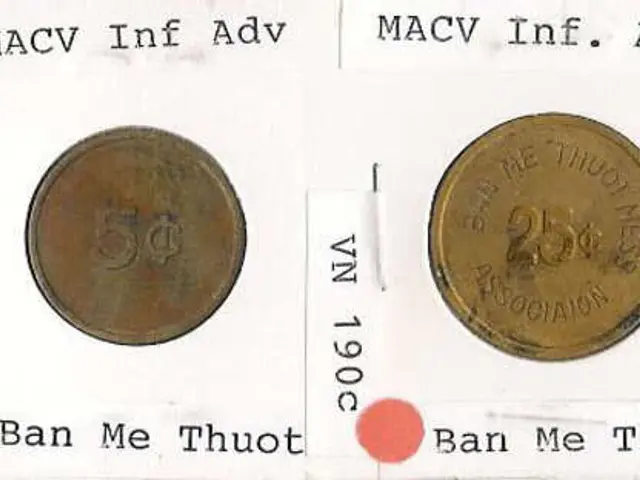Countries urged by China to track cryptocurrency transactions
In the ever-evolving world of cryptocurrencies, regulation is becoming a crucial element, with various regions adopting different approaches to ensure transparency, security, and compliance.
China's Strict Cryptocurrency Regulation
China, one of the world's financial powerhouses, maintains a firm stance on decentralized cryptocurrencies, such as Bitcoin. The People's Bank of China has imposed strict regulations, focusing primarily on enforcement against illicit activities. Courts in China have set a "should have known" legal standard for crypto-related money laundering, leading to prison sentences for those involved in such activities. Officially, China has banned decentralized cryptocurrency trading and mining, while promoting its own digital yuan and potentially a yuan-backed stablecoin to internationalize its currency and challenge the US dollar [1][2][3][4].
Hong Kong's Regulatory Environment for Stablecoins
In contrast, Hong Kong, a key global financial hub, has a more open regulatory environment for stablecoins. Regulations require stablecoins pegged to the Hong Kong dollar to be fully backed by one-to-one reserves. This regulatory framework aims at transparency and stability, positioning Hong Kong as a possible stablecoin and digital currency center in the region [2].
Global Cryptocurrency Regulation: A Fragmented yet Focused Approach
Globally, cryptocurrency regulation is fragmented but increasingly focused. Many jurisdictions require licensing of stablecoin issuers and exchanges to ensure regulatory compliance and consumer protection. Authorities are enhancing cooperation to track suspicious cross-border crypto flows, aiming to combat money laundering and illicit finance. Major banks, such as HSBC and Standard Chartered, are actively involved in the cryptocurrency space by facilitating compliance with AML regulations, exploring digital asset custody, and engaging with central bank digital currency (CBDC) infrastructures. Their role helps bridge traditional finance with regulated crypto services, emphasizing rigorous Know Your Customer (KYC) and transaction monitoring protocols [1].
The People's Bank of China's 2024 Financial Stability Report
In 2024, the People's Bank of China released a Financial Stability Report, emphasizing the importance of cryptocurrency market regulation. The report highlighted potential risks associated with the expansion of cryptocurrency use in payments and retail investments [5].
International Coordination and the Role of Major Financial Institutions
International coordination on cross-border monitoring of crypto-assets is a key task. Major global financial players, like HSBC and Standard Chartered, are playing increasingly important roles in facilitating licensed and monitored crypto activities, bridging the gap between traditional finance and regulated crypto services [1].
The Trump Administration's Crypto-Friendly Stance
The CEO of HashKey Group, Xiao Feng, suggested that the Trump administration's crypto-friendly stance could influence China's approach to digital assets [6].
In summary, this overview highlights China's rigid stance on private cryptocurrencies but proactive push for sovereign digital currency, Hong Kong's more open regulatory environment for stablecoins, and major global financial players' evolving roles facilitating licensed and monitored crypto activities.
[1] HSBC and Standard Chartered Involvement in Cryptocurrency Regulation: https://www.reuters.com/business/finance/hsbc-standard-chartered-to-include-bitcoin-transactions-in-client-oversight-2021-06-28/ [2] Hong Kong's Stablecoin Regulations: https://www.bloombergquint.com/onweb/hong-kong-to-require-stablecoins-to-be-backed-by-one-to-one-reserves [3] China's Digital Yuan and Yuan-Backed Stablecoin: https://www.cnbc.com/2021/03/25/china-is-testing-its-digital-yuan-in-four-more-cities-including-beijing.html [4] China's Ban on Decentralized Cryptocurrencies: https://www.reuters.com/article/us-china-bitcoin-ban/china-bans-cryptocurrency-exchanges-in-big-blow-to-bitcoin-market-idUSKBN19Y27Q [5] People's Bank of China's 2024 Financial Stability Report: https://www.pbc.gov.cn/publish/list/2024/10/20241015_2301802.html [6] Trump Administration's Crypto-Friendly Stance Influencing China: https://www.bloombergquint.com/onweb/trump-administrations-crypto-friendly-stance-could-influence-chinas-approach-to-digital-assets
Finance, technology, and business intersect significantly in the cryptocurrency landscape as global regulators develop fragmented yet focused strategies. For instance, China's financial sector applies stringent regulations to decentralized cryptocurrencies like Bitcoin, focusing on combating illicit activities, while promoting its own digital yuan and yuan-backed stablecoin (finance, business, technology). Simultaneously, Hong Kong's business environment offers a more accommodating regulatory environment for stablecoins, requiring one-to-one reserve backing and aiming for transparency and stability (finance, technology, business).




